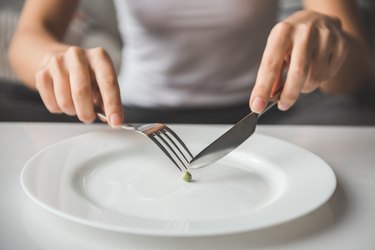
For a word with only four letters, "diet" sure does pack a lot of punch. Although the term can be used loosely to describe any type of eating regimen, many of us think of it negatively, says registered dietitian Mandy Enright, associating it with restriction, rigidness and deprivation.
Plus, many of us probably don't associate "diet" with successful weight loss, and for good reason: Most of the time, diets in the traditional sense are not effective in helping people lose weight and keep it off.
Video of the Day
Video of the Day
In one study, published March 2012 in the International Journal of Obesity, researchers argued that dieting actually leads to long-term weight gain. The study included 4,000 twins ages 16 to 25 and found that those who dieted were more likely to gain weight than their non-dieting identical twins. A single diet doubled a man's odds of becoming overweight and tripled the odds for women. In fact, women who had gone on two or more diets during the study period were five times as likely to become overweight.
Enright says this is partly due to the way most diets are designed: to meet short-term successes, with little focus on transforming mental habits, coping mechanisms and lifestyle requirements.
Here, reasons why dieting might not be working for you — and what to do instead.
1. Most Diets Are Designed to Fail
Enright estimates that 95 percent of all diets end up failing, for a variety of reasons. First, diets promote an 'all-in' approach, encouraging those who want to lose weight to give up everything, right away. Sort of like the journey to give up cigarettes, going cold turkey is problematic, since addictions don't cure themselves overnight.
Setting unrealistic requirements — like no dairy, gluten or sugar, ever — gets in the way of systematic success, Enright says. "People feel deprived and frustrated, which ultimately causes them to 'break and binge,'" she explains. This means you will follow the rules for a period of time — say a month — and then slip up. Instead of giving yourself a break, most people throw up the white flag of defeat, and return to their unhealthy choices, often eating more than they did before the diet began.
Fix it: Instead of limiting yourself, Enright suggests adopting positive routines. This means focusing on 'more' rather than less. By including more fruits and vegetables, more exercise and more water intake, you fuel and prepare your body to shed pounds. And if you are naturally satiated with fiber-rich meals, you won't be as hangry for sweets.
2. Dieting Can Promote Disordered Eating
Before deciding to 'go on a diet', registered dietitian Lee Cotton, suggests exploring your motivation. Are you inspired to become healthier to feel better and have a richer source of energy? Or are you giving into societal pressure to look a certain way?
If it's the latter, dieting is a source of body dissatisfaction, and can lead to disordered eating patterns. Because our culture has set standards that a number on a scale is equivalent to beauty, Cotton says many people will lose weight quickly to feel attractive. And then of course, because a diet isn't sustainable, they gain it back. This does very little to promote a positive body image, and only encourages perfectionism. "A diet does not provide eating in a way that balances hunger, enjoyment and satiety. It can ignore the physiological needs of the body. It creates a behavior that ignores body cues and creates deprivation," she continues.
Fix it: To combat this, Cotton suggests adopting a non-diet approach to your meals, called mindful eating. This teaches you to pay attention to the times when you're eating due to emotion and when you're actually hungry. By honoring the cues of your body, you can better balance what you need — and what you don't.
"A set of rules that work for one person may make another person feel terrible. Only you know how you feel in response to certain foods. Let your body tell you how to feed it best."
3. Diets Don't Take Different Bodies into Consideration
Though two people can eat the exact same meal and follow the exact rules of a program, their results can vary greatly. As the adage goes, there are very few things in life that are one-size-fit all, and everyone's body reacts differently to diets, according to registered dietitian Kaleigh McMordie.
For one, some folks process various food groups better than others. As an example, McMordie says to consider someone who has celiac disease or a severe gluten-intolerance. They will become physically sick if they eat the wrong foods. However, those without a sensitivity can include gluten-rich foods, like wheat bread or farro, as part of a balanced diet. The same goes for conditions like irritable bowel syndrome or any other food allergy. "So, a set of rules that work for one person may make another person feel terrible. Only you know how you feel in response to certain foods," McMordie says.
Fix it: To understand your own body — and its preferences — McMordie says to pay attention to how foods make you feel. And consider keeping a journal to help you identify patterns. From frequency to specific foods, take notes on how your body reacts. "You may find that eating smaller, more frequent meals is a pattern that makes you feel your best. Or you might be the type of person who just isn't hungry in the morning and you feel better waiting a few hours then eating a bigger meal," she continues. "You may feel great eating dairy foods at every meal, or you may be sensitive to dairy. Let your body tell you how to feed it best."
Read more: 10 Dos and Don'ts for Using a Food Diary

4. Dieting Puts the Focus on Food — and Nothing Else
Think back to the last time you put yourself on a self-imposed diet. What consumed your thoughts? If you're like most people, your mind zeroed in on carbs, protein, calories and the rest of it, non-stop.
Though it is true that what we eat has a significant impact on our ability to maintain a healthy weight, all too often, food is the only focus for dieters, according to Mascha Davis, MPH, RDN. By doing this, we discount other factors that contribute to our waistline, including exercise, quality sleep and mental health.
Fix it: It's essential to navigate our relationships with food. Why do we nominate some choices as 'bad', while others are OK? How much of our self-worth do we tie to how much we weigh? Davis says taking the time to answer these questions, and giving ourselves time to slowly improve our well-being will create longer-lasting results, from soul to body, and beyond.
"If your body changes in response to you living an enjoyable life where you are free to pursue your passions and have satisfying relationships, it may have needed to change."
If you've ever completed a round of Whole30 or tested your luck at following a keto diet, you have probably felt socially shunned. After all, it's incredibly difficult to have a meal out with friends when you have to pull the waiter aside to explain what you can eat — and what needs to be far, far away from your plate.
That's why many people tend to isolate themselves while on a diet, fearing their friends will judge them or become annoyed with their restrictions. In a way to protect themselves or avoid being questioned, McMordie says they'll stay home, away from those they love. Very quickly, this can lead to depression.
"Humans are social beings, and we need connection with others. A lot of that connection happens over food," she says. "If you're unable to eat the same food as those around you, it can make you feel alone and eventually you may stop being social due to both the extra effort and anxiety of having to deal with your diet in a social setting."
Fix it: First, figure out your mentally healthy space with food. Perhaps this is doing Whole30 for a month to identify food sensitivities, and then adapting your findings into your meal planning. Maybe it is doing keto seriously for a while, and then becoming more relaxed as you maintain.
The bottom line is this: Healthy eating is a lifestyle choice, not a diet. "Not having anxiety over a spontaneous ice-cream date with your significant other or not being in control of the restaurant your family chooses for dinner frees you up to relax and enjoy the moment with the people that are important to you," McMordie says. "If your body changes in response to you living an enjoyable life where you are free to pursue your passions and have satisfying relationships, it may have needed to change."
Was this article helpful?
150 Characters Max
0/150
Thank you for sharing!
Thank you for your feedback!